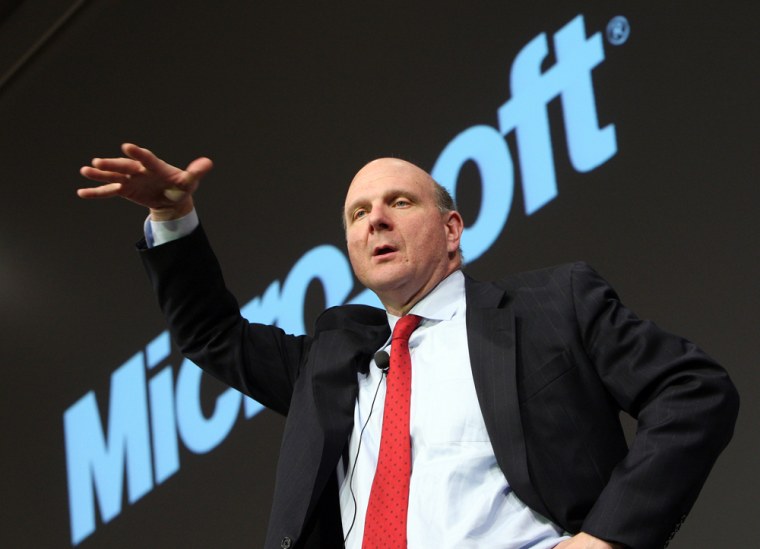Microsoft’s decision to drop its pursuit of rival Yahoo could free the software giant to strike other deals aimed at better competing with online leader Google and to redouble its focus on its traditional strength: making software.
Or, some speculate, it could end up just being just another twist in the road that eventually leads to the two companies coming together after all.
“My impression is we probably haven’t heard the last of this,” said Matt Rosoff, analyst with the independent research firm Directions on Microsoft.
Microsoft Corp. said late Saturday that it was dropping its bid for Yahoo Inc. after the two companies could not come to an agreement despite Microsoft’s offer to raise its bid by roughly $5 billion, to about $33 per share. Yahoo Chairman Roy Bostock said in a separate statement Saturday that Yahoo felt the unsolicited deal undervalued his company.
(Msnbc.com is a joint venture of Microsoft and NBC Universal.)
The surprise decision came about three months after Microsoft announced its intention to acquire Yahoo as part of an effort to bolster its online businesses and better compete with Google Inc.
Google, once merely seen as an annoying thorn in Microsoft’s side, has grown from a search engine provider to an Internet powerhouse threatening a number of Microsoft’s traditional cash cows. Meanwhile, Microsoft has been working to make headway against Google’s core businesses, most importantly the lucrative field of Internet advertising.
From the start, however, Yahoo made clear that it was unhappy with the terms of Microsoft’s offer for its business, and the threat of a messy hostile bid loomed.
Rob Enderle, a longtime technology analyst who heads Enderle Group, said Sunday that he thought Microsoft Chief Executive Steve Ballmer dropped the bid after Microsoft’s board determined that a friendly takeover was unlikely and a hostile attempt would be too distracting. In addition to finding a price shareholders agreed to, Microsoft would have had to go through a number of regulatory and other hurdles, Enderle said, followed by the challenge of integrating the two companies.
“The reality is there are enough people that were influential in and around Microsoft in terms of board members and stockholders that I think (Ballmer) just finally realized this wasn’t a good idea,” Enderle said.
He noted that many similarly large technology mergers have proved expensive and time-consuming, while not always providing the results the two companies expected. Most recently, the tech industry watched as computer makers Compaq and Hewlett-Packard struggled to join forces.
“The company gets this idea that one plus one equal two with these big mergers, but oftentimes one plus one equals 1.25,” he said.
Still, other analysts were more optimistic that the deal would have been successful — and wondered whether it is completely off the table even now. Rosoff, of Directions on Microsoft, said he thinks Microsoft needs a boost like the Yahoo deal to propel its online business forward, and he thinks the company is big enough that such an effort wouldn’t distract from the other elements of the company’s operations.
“If Microsoft is serious about competing in online … they need to do a big acquisition,” Rosoff said.
Even if a deal never happens, Enderle said the attempt to acquire Yahoo might have had an upside for Microsoft. He thinks it could open the door for Microsoft to bolster its online businesses through partnerships with other companies, such as AOL or News Corp., and those moves could also provide an edge against Google.
With plenty of cash on hand, Microsoft also could pursue some other, smaller acquisitions. That would allow Microsoft to bolster parts of their Internet business without going through the growing pains of incorporating a big new group of people from a different corporate culture.
Enderle also said that, by giving up on the Yahoo deal, it also could again give Microsoft’s top executives time to focus on the areas of the company that have been its most successful: the Windows operating system and Office business software franchises, and the division that makes server software.
Microsoft’s server and tools division has often been a bright spot in Microsoft’s balance sheet, and Enderle said there is potential there for the company to gain even more market share in that field. Office also is hugely profitable, and Microsoft would do well to continue to nurture that business.
Meanwhile, the company’s flagship Windows division is struggling with users who are dissatisfied with the latest version, Vista, and some are even pressuring the company to keep offering its predecessor XP. As Microsoft grapples with that problem, Google has slowly been edging in on Microsoft’s turf on the desktop, while also offering Web-based applications that compete directly with Microsoft software.
